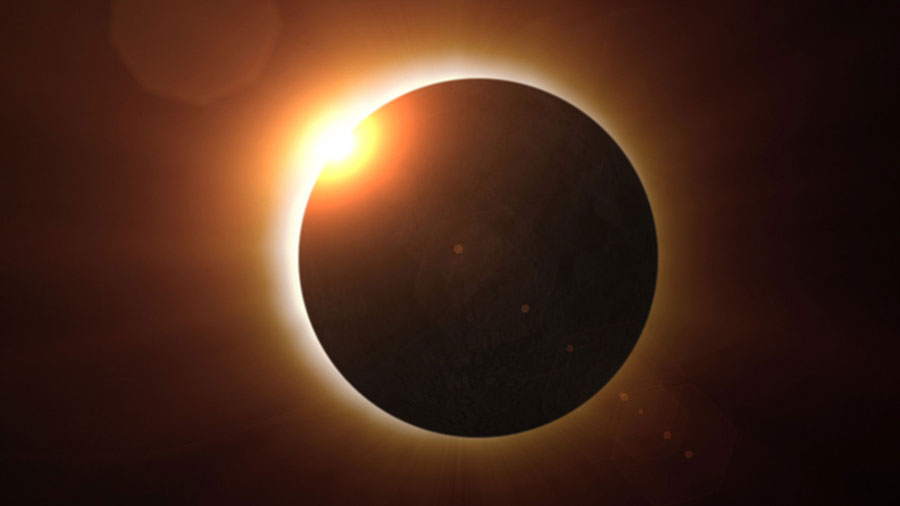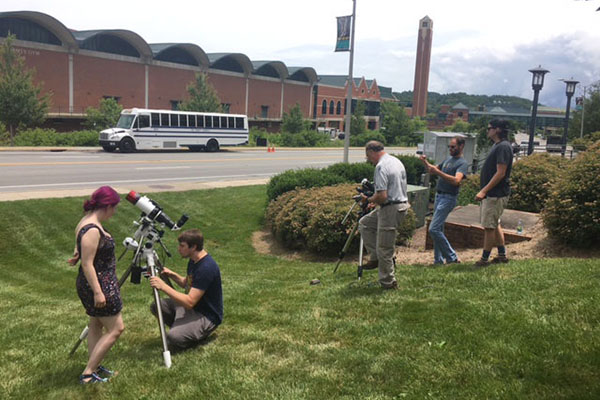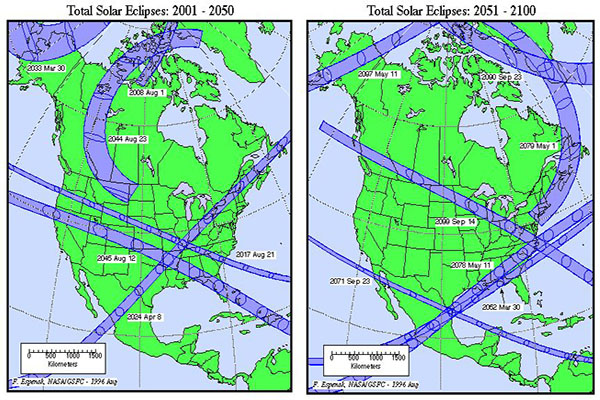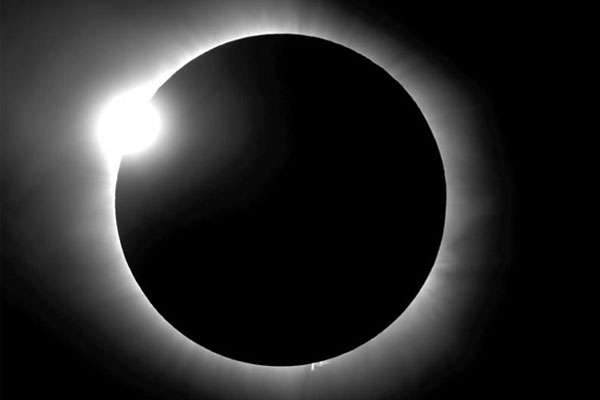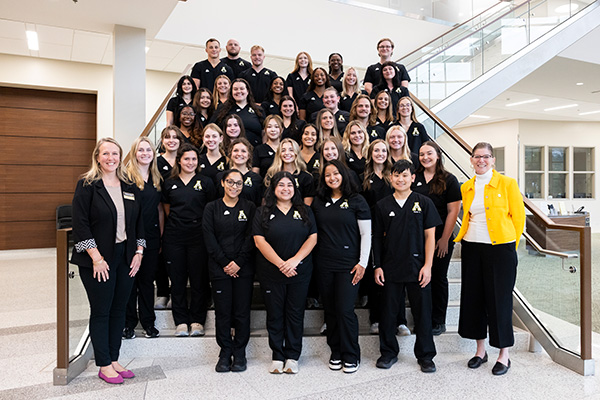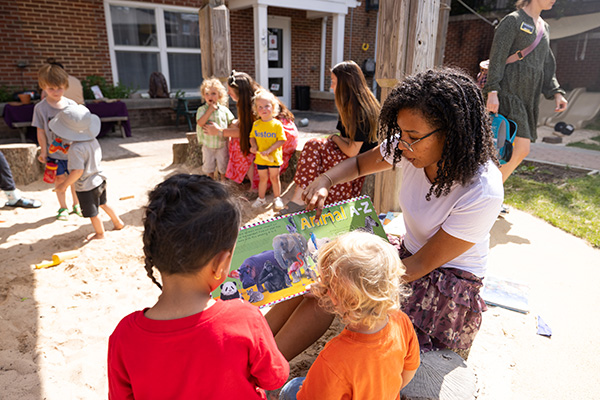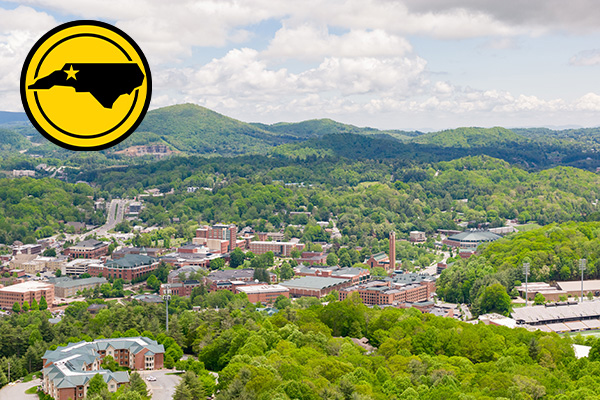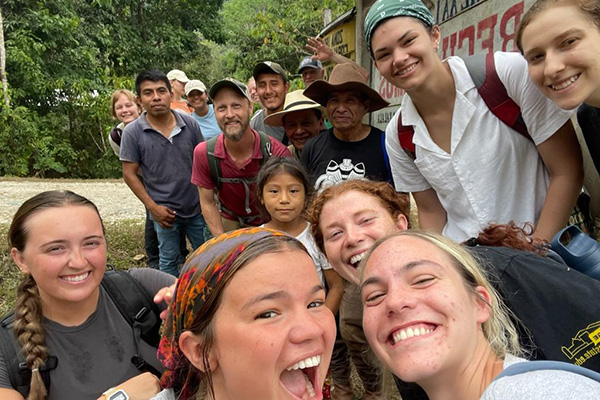The first total solar eclipse since 1918 is happening on Monday, August 21, and people across the country are gearing up to view the astronomical event.
BOONE, N.C.—As the Great Solar Eclipse approaches this August, there is much to learn about and participate in during the lead up to this rare event. Members of the Department of Physics and Astronomy in the College of Arts and Sciences at Appalachian State University have partnerships and community outreach events happening for the next month across the area.
The Dark Sky Observatory (DSO), established in 1981, is the research facility used by faculty and their students to conduct observational research in astrophysics. It is equipped with five telescopes, each used regularly for CCD imaging, photometry and spectroscopy. The observatory is located about 20 miles northeast of Boone at an elevation of 3,300 feet. Far from major cities and light pollution, the dark skies in the area provide a great setting for digital imaging and astronomical research projects.
The observatory will offer a public nighttime event as part of the Evening at DSO series July 29, in addition to the free daytime tours with solar viewing it has offered throughout July. The July 29 evening event will require the purchase of tickets online in advance; visit http://dso.appstate.edu/ for more information. Daytime tours and viewing depend on the weather. The daily event status will be posted on the DSO website at http://dso.appstate.edu/ and on the DSO Facebook and Twitter feeds. The daytime events do not require tickets and solar viewing glasses will be available to all participants. There will be no event on the day of the solar eclipse at the observatory.
The Smoky Mountain STEM Collaborative (http://stem.appstate.edu/node/136), under the leadership of Southwestern Community College (SCC), provides opportunities for K-12 and community college students in southwestern N.C. to participate in outreach and research activities on the Appalachian campus. In addition, the project seeks to increase capacity for community college faculty to teach astronomy.
The Smoky Mountain STEM Collaborative team is led by Matthew Cass, the science chair at Southwestern Community College. Cass is a two-time graduate of Appalachian, BA physics in 2004 and MS engineering physics 2006. Joining Case are several faculty from Appalachian including Dr. Michael Briley, chair of physics and astronomy; Dr. Dan Caton, physics and astronomy and director of observatories; David Sitar, physics and astronomy; Dr. Renè Salinas, mathematical sciences; and Dr. Trina Palmer, mathematical sciences. These faculty provide a variety of experiences, including mentoring of community college students in activities related to science professions.
This summer, undergraduates Lucas Sanders and Christine Massingale of Southwestern Community College have been working with Appalachian faculty members David Sitar and Dr. Dan Caton of the physics and astronomy department along with graduate student Jared Day, MS engineering physics, and undergraduate Ellie Prim, physics, secondary education. Together these students and faculty have filmed educational videos about the upcoming Solar Eclipse event on Aug. 21, and they have been key in the planning of events on campus at Appalachian by testing a wide-field refractor with a Mylar (white light) filter on a telescope. They will be streaming the eclipse at http://cas.appstate.edu/solar-eclipse-2017 and on campus in Kidd Brewer Stadium for Freshmen Black and Gold and in Grandfather Ballroom for other campus and community participants on Aug. 21.
Prim received a local N.C. Space Grant to assist Sitar with solar eclipse planning, as well as make astronomical instrumentation upgrades at the Rankin Science GoTo Astronomy Laboratory. In addition, she has been involved with updating the introductory astronomy lab manual by converting it to a digital format and assisting with the design and implementation of new computers for the introductory astronomy lab. Prim was also awarded a SAFE grant from the College of Arts and Sciences to create safety and informational videos regarding the eclipse. You can watch the videos on the College of Arts and Sciences website at: www.cas.appstate.edu/eclipse.
Sitar and Prim will be visiting the Wilkesboro County Public Library two times in late July to provide information on the upcoming solar eclipse, solar viewing with telescopes and for an evening of planet viewing. For details, visit, http://www.arlibrary.org/wilkes.
On July 28, Sitar and students including Prim will host a star party at the Valle Crucis Community Park during and after Friday night’s Music in the Valle.
Day also received a N.C. Space Grant Graduate Fellowship to work with Dr. Anthony Calamai in his Ion Trapping Laboratory to develop an ion-dynamics simulation code that will guide the construction of a new type octupole ion trap. They have worked to set up the Appalachian-Cain Eclipse-Viewing Station, which will take images of the eclipse every several seconds in August, and display those images on a large monitor to the visitors on SCC’s campus.
On Aug. 10, Rachel Smith will participate in a Science Café at the N.C. Museum of Natural Sciences in Raleigh. She will share information about the physics behind eclipses, the exciting science made possible by such events and how you can be part of the celestial event on Aug. 21. She is jointly appointed as an assistant professor in the Department of Physics and Astronomy at Appalachian and is the director of the Astronomy & Astrophysics Research Lab and Curator of Meteorites at the N.C. Museum of Natural Sciences.
On Aug. 16, Carla Ramsdell will provide a solar cooking demonstration at Valle Crucis Park at 11 a.m. learn more at https://www.facebook.com/events/143810419529601/. A senior lecturer in the Department of Physics and Astronomy, Ramsdell is passionate about bridging the gap between scientific research and the general public in the areas of climate change, energy generation and efficient cooking strategies.
On Aug. 20, the night before the eclipse, Southwestern Community College will host a panel discussion from 6 to 7 p.m. It will be moderated by Matthew Cass, with discussion about the significance and interest in the solar eclipse in Sylva, N.C. Sitar and Caton will participate in the discussion that will be live streamed on the www.cas.appstate.edu website.
On Aug. 21, the day of the eclipse, Appalachian will host campus and community members on Sanford Mall and in the Grandfather Mountain Ballroom of the Plemmons Student Union for solar viewing with telescopes, a portable planetarium and a live stream of totality from Sylva, N.C. Solar viewing glasses will be provided for safe viewing of the eclipse.
In the event of rain, events will still take place in the Grandfather Mountain Ballroom on campus. To check event status or purchase a ticket at the Observatory visit: http://dso.appstate.edu. For more details about any of these events, safety information and more about the participating students and faculty in this on-going project, please visit our website: http://cas.appstate.edu/eclipse.
About the Solar Eclipse
On Aug. 21, 2017, a total solar eclipse happens when the Moon completely covers the Sun in the sky, blocking its light and allowing the Sun’s outer atmosphere to become viewable. Stars and planets can be visible on a clear day, appearing just like the night sky. Outside the path of a total eclipse, sky watchers around the continental United States will still see a partial eclipse, in which the Moon appears to cover a portion of the Sun, but the sky will not darken completely, if at all.
The path of the total eclipse will be 70 miles wide and will stretch from Oregon to South Carolina. The timing of the total solar eclipse and its duration will depend on where the viewer is located in the path of totality. At most, the Moon will completely cover the disk of the Sun for two minutes and 40 seconds, but the entire event may take up to three hours.
Anyone planning to view the eclipse should wear solar viewing glasses. This protective eyewear makes it possible for viewers to look directly at the Sun before and after totality. Regular sunglasses cannot be used! Looking directly at the Sun, even when it is partially covered by the Moon can cause serious eye damage. The only time it is safe to take the protective eyewear off, is during the few minutes of totality, when the Sun is completely covered by the Moon. If you are outside the path of the total solar eclipse, you should not look at the sun without your solar viewing glasses.
About the Department of Physics and Astronomy
The Department of Physics and Astronomy’s curriculum has an applied nature that includes a core of fundamental physics courses and laboratory experiences. It prepares graduates for a variety of scientific, teaching or engineering professions, as well as future educational endeavors.
About the College of Arts and Sciences
The College of Arts and Sciences is home to 16 academic departments, two stand-alone academic programs, two centers and one residential college. These units span the humanities, social sciences, and the mathematical and natural sciences. The College of Arts and Sciences aims to develop a distinctive identity built upon our university’s strengths, traditions and unique location. Our values lie not only in service to the university and local community, but through inspiring, training, educating and sustaining the development of our students as global citizens. There are approximately 5,850 student majors in the college. As the college is also largely responsible for implementing Appalachian’s general education curriculum, it is heavily involved in the education of all students at the university, including those pursuing majors in other colleges. Learn more at http://cas.appstate.edu
About Appalachian State University
As a premier public institution, Appalachian State University prepares students to lead purposeful lives. App State is one of 17 campuses in the University of North Carolina System, with a national reputation for innovative teaching and opening access to a high-quality, cost-effective education. The university enrolls more than 21,000 students, has a low student-to-faculty ratio and offers more than 150 undergraduate and 80 graduate majors at its Boone and Hickory campuses and through App State Online. Learn more at https://www.appstate.edu.
What do you think?
Share your feedback on this story.
